Juuva Review: Nutrition and a whole lotta kooky
 Juuva was founded in 2013 and operates in the nutritional supplement MLM niche.
Juuva was founded in 2013 and operates in the nutritional supplement MLM niche.
The company fails to provide a corporate address on its website. On Facebook however Juuva states it’s “headquartered in Pleasant Grove, Utah”.
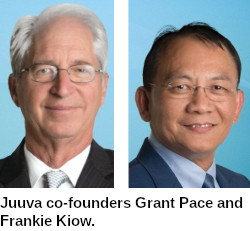 Heading up Juuva are co-founders Frankie Kiow and Grant Pace.
Heading up Juuva are co-founders Frankie Kiow and Grant Pace.
Frankie Kiow is credited only as one of Juuva’s co-founders. As per his corporate bio, Kiow
is a member of the Juuva Board of Directors and from Shanghai leads Juuva’s preparations to formally enter China.
Frankie has more than 31 years direct sales and networking experience in Asia.
MLM companies featured in Kiow’s corporate bio include Longrich International, Joymain, Orient Life, Winalite Sara Lee and Nu Skin.
Kiow’s involvement in each of these companies appears limited to China.
Grant Pace is cited as Juuva’s President, CEO and Chairman of the Board of Directors.
As with Kiow, Grant’s Juuva corporate bio credited with ‘over 25 years of experience in the direct selling industry’.
This includes executive positions with Shaklee, Nu Skin, Sara Lee and Avon.
Of note is Kiow and Grant’s involvement in the Chinese MLM approval process.
(Grant) has extensive experience in China where, together with Frankie Kiow, he helped secure Direct Selling Licenses in China for four of the current seven US companies with government granted licenses in China.
Read on for a full review of Juuva’s MLM opportunity.
Juuva’s Products
Juuva markets a range of nutritional supplements… with kooky additions.
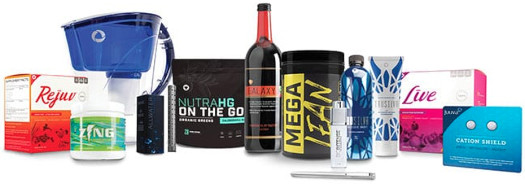
Juuva’s nutritional supplement range consists of:
- TruSilvr – “the fastest, safest, most effective way to destroy yeast, viruses, bacteria and mold without side effects”, retails at $50 a bottle
- TruSilvr Gel – “a topical version of our wildly successful TRUSILVR Liquid with the added healing properties of infused oxygen”
- Galaxy – “a high impact liquid nutritional supplement containing 32 bioactive components”, retails at $85 a bottle or $110 for a thirty-serve travel pack
- AllWater – “Alka Drops alkalize any water type with just one drop per ounce of water”, retails at $55 a bottle
- BioIntense Nano – “a unique and luxurious blend of powerful antioxidants, collagen building proteins, and rich botanicals that rejuvenate your skin”, retails at $93 a bottle
- Live – “a whole-food blend of fruits, vegetables, organic healthy grains, super fruits, probiotics, and digestive enzymes to help you achieve optimal nutrition”, retails at $95 for a pack of thirty single-serve sachets
- MegaLean – meal replacement shake, retails at $95 a tub
- NutraHG – “all-natural organic fusion of restorative super greens to energize, soothe, calm and focus your body and mind, retails at $105 a pouch
- Zing – “delivers instant and sustained energy in a delicious drink mix”, retails at $95 a tub
- Rejuv – “stay energized with the all-natural Crash Free ingredients”, retails at $95 a box
Note that I’m mostly unable to provide quantities because Juuva’s online shopping portal is lacking.
On the kooky side of things Juuva markets
- Energy Pitcher C7 – “generates negative hydrogen, one of the most powerful antioxidants in the world”, retails at $180
- Juuva Energy Stick – “provides unique filtration technology that converts everyday drinking water into alkalized, ionized and magnatized [sic] water”, retails at $85
- Anion Emitter – “bathe your body with a certified 2000 negative ions per inch”, retails at $200
- Cation Shield – “deflect dangerous EMFs”, retails at $85
Not so kooky Juuva branded drink bottles are also available.
Juuva’s Compensation Plan
Juuva fails to provide a copy of their compensation plan on their website.
This review is based on a “prosperity plan” presentation by Juuva Master Distributor Jeff Bracken, uploaded to YouTube in January 2019.
Juuva Affiliate Ranks
There are eleven affiliate ranks within Juuva’s compensation plan.
Along with their respective qualification criteria, they are as follows:
- Silver – maintain a 70 PV monthly product order, generate 625 PV in pay leg volume and 70 GV in Enrollment Tree PV every 4 weeks
- Gold – maintain a 70 PV monthly product order, generate 1250 PV in pay leg volume and 140 GV in Enrollment Tree PV every 4 weeks
- Platinum – maintain a 140 PV monthly product order, generate 2500 PV in pay leg volume and 250 GV in Enrollment Tree PV every 4 weeks
- Double Platinum – maintain a 140 PV monthly product order, generate 5000 PV in pay leg volume and 500 GV in Enrollment Tree PV every 4 weeks
- Triple Platinum – maintain a 210 PV monthly product order, generate 10,000 PV in pay leg volume and 1000 GV in Enrollment Tree PV every 4 weeks
- Diamond – maintain a 210 PV monthly product order, generate 20,000 PV in pay leg volume and 3000 GV in Enrollment Tree PV every 4 weeks
- Double Diamond – maintain a 210 PV product order, generate 40,000 PV in pay leg volume and 8000 GV in Enrollment Tree PV every 4 weeks
- Triple Diamond – maintain a 210 PV product order, generate 80,000 PV in pay leg volume and 16,000 GV in Enrollment Tree PV every 4 weeks
- Crown – maintain a 280 PV product order, generate 160,000 PV in pay leg volume and 40,000 GV in Enrollment Tree PV every 4 weeks
- Double Crown – maintain a 280 PV product order, generate 320,000 PV in pay leg volume and 80,000 GV in Enrollment Tree PV every 4 weeks
- Triple Crown – maintain a 280 PV product order, generate 640,000 PV in pay leg volume and 160,000 GV in Enrollment Tree PV every 4 weeks
PV stands for “Personal Volume” and is sales volume generated by a Juuva affiliate’s product orders.
GV stands for “Group Volume” and is PV generated by a Juuva affiliate’s downline.
Here’s how Juuva’s compensation describes Enrollment Tree PV;
Enrollment Tree PV required in reference leg and pay leg(s).
These values don’t make sense considering pay leg volume amounts are larger than required Enrollment Tree PV.
E.g. Platinum rank requires 2500 pay leg PV and 250 Enrollment Tree PV.
2500 PV pay leg volume is already larger than 250 PV Enrollment Tree PV, so the requirement doesn’t make sense.
I believe what Enrollment Tree PV might represent is the minimum GV generated in a unilevel team leg, in order for that leg to qualify as a pay leg.
I wasn’t able to confirm this however so I’m leaving this note here. If anyone in Juuva wishes to clarify this please leave a comment below.
Retail Commissions
Juuva pays commissions on sales to retail customers.
Retail commissions are paid as the difference between the wholesale and retail price of products ordered.
Recruitment Commissions
Juuva affiliates earn a commission on recruitment of new affiliates.
- recruit a Basic affiliate and receive $20
- recruit an Advanced affiliate and receive $50
- recruit a Pro affiliate and receive $100
- recruit a Builder Pack affiliate and receive $125
Residual Commissions
Juuva pays residual commissions via a modified unilevel compensation structure.
In a typical unilevel compensation structure, personally recruited affiliates are placed on level 1. Affiliates they recruit are placed on level 2 and so on and so forth.

Juuva’s modified unilevel structure (used to calculate residual commissions), allows affiliates to place recruited affiliates anywhere in their unilevel team.
At the end of each week Juuva tallies up sales volume in each unilevel team leg.
Commissions are paid as a percentage of pay legs. Pay legs exclude the largest volume leg (“reference leg”) and I believe need to meet rank Enrollment Tree PV to be paid out on.
Residual commission rates are determined either by how much a Juuva affiliate spends when they sign up, or via qualified for rank.
Pay to play commission rates
- Basic tier affiliates receive 9% capped at $500 per pay leg a week
- Advanced tier affiliates receive 10% capped at $750 per pay leg a week
- Pro tier affiliates receive 11% capped at $1000 per pay leg a week
Rank-based commission rates
- Silver ranked affiliates receive 10% (11% if Pro tier), capped at $1000 per pay leg a week
- Gold ranked affiliates receive 10% (11% if Pro tier), capped at $2000 per pay leg a week
- Platinum ranked affiliates receive 10% (11% if Pro tier), capped at $3000 per pay leg a week
- Double Platinum ranked affiliates receive 10% (11% if Pro tier), capped at $4000 per pay leg a week
- Triple Platinum ranked affiliates receive 11% capped at $5000 per pay leg a week
- Diamond ranked affiliates receive 12% capped at $8000 per pay leg a week
- Double Diamond ranked affiliates receive 12% capped at $9,000 per pay leg a week
- Triple Diamond ranked affiliates receive 12% capped at $10,000 per pay leg a week
- Crown ranked affiliates receive 13% capped at $13,000 per pay leg a week
- Double Crown ranked affiliates receive 13% capped at $14,000 per pay leg a week
- Triple Crown ranked affiliates receive 13% capped at $15,000 per pay leg a week
Once volume is paid out on, it is matched against the reference leg and flushed.
Any leftover volume in the reference leg carries over into the following week.
Matching Bonus
The Matching Bonus is paid on residual commissions earned by downline affiliates.
The Matching Bonus uses the same unilevel team residual commissions are calculated on, with standard placement.
That is personally recruited affiliates are placed on level 1, affiliates they recruit are placed on level 2 and so on and so forth.
The Matching Bonus is paid as a percentage of residual commissions earned by downline affiliates as follows:
- Basic tier affiliates receive a 5% match on level 1 (personally recruited affiliates)
- Advanced tier affiliates receive a 6% match on levels 1 and 2
- Pro tier affiliates receive a 7% match on levels 1 to 3
Generation Bonus
From the Triple Platinum rank, the Matching Bonus is converted to a generational bonus.
Juuva defines a generation within the unilevel team (traditional placement) when a Triple Platinum is found in a unilevel team leg.
This ranked affiliate caps off the first generation for the leg, with the second beginning immediately after.
If a third Triple Platinum exists deeper in the leg, they cap off the second generation. The third generation then begins under them.
If no such ranked affiliate exists, the second generations runs the full depth of the leg.
Using this generational structure, Juuva affiliates can earn a check match on up to X generations per unilevel team leg.
- Triple Platinums earn on up to three generations per unilevel leg
- Diamonds earn on up to five generations per unilevel leg
- Double and Triple Diamonds earn on up to seven generations per unilevel leg
- Crowns and Double Crowns earn on up to eight generations per unilevel leg
- Triple Crowns earn on up to nine generations per unilevel leg
The exact percentage paid out on each generation is a floating percentage. In the presentation cited for this review Jeff Bracken provides a 10% average.
Joining Juuva
Juuva affiliate membership is tied to a product purchase:
- Basic – purchase 140 PV worth of Juuva products
- Advanced – purchase 350 PV worth of Juuva products
- Pro – purchase 750 PV worth of Juuva products
- Builder Pack – purchase “one of all the products Juuva has to offer”, cost not disclosed
If a an affiliate wants to upgrade, they are able to purchase the next tier up within 60 days of signing up.
Juuva charges affiliates $1 for the first thirty days access to their backoffice and then $24.95 monthly.
Conclusion
Juuva offers up a disturbing combination of whacky products and a recruitment driven compensation plan.
Let’s start with the products.
On the surface I don’t have a problem with Juuva’s nutritional offering. I’m a bit iffy on the alkaline water thing – unless polluted, water is healthy as far as I’m concerned.
What struck me as concerning is how Juuva’s products are marketed. And this potentially ties into experience in the Chinese market of Juuva’s co-founders.
As I searched for a recent copy of Juuva’s compensation plan (which they should absolutely be providing on their website, no exceptions), I came across this slide:
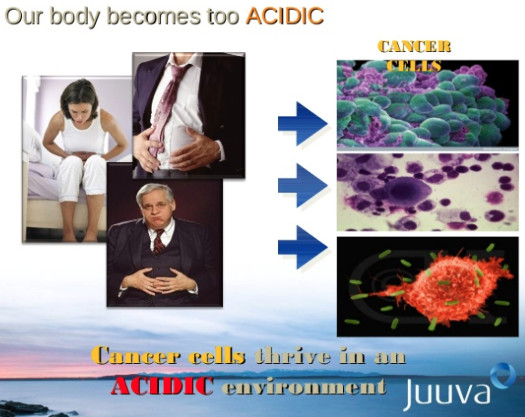
What you’re looking at there is the implication that Juuva’s alkaline water products, in a marketing presentation branded with Juuva’s logo, can be used to treat and/or prevent cancer.
That set off my alarm bells and before long I was down Juuva’s illegal medical claims rabbit hole.
One marketing slide claimed Juuva’s Galaxy drink had clinical studies backing it, which showed “anti-cancer activity” pertaining to a number of varieties.
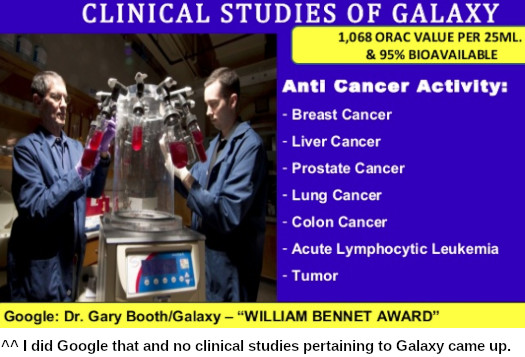
Naturally the claimed study in question wasn’t directly cited or provided.
Another marketing slide compared Juuva’s Galaxy to rival MLM company’s products, claiming again that “clinical research” proved Galaxy was “anti-cancer”.
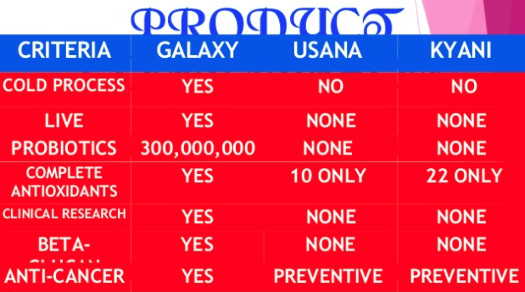
I was not able to find one study showing Juuva’s products, any of them, have any effect on preventing or the treatment of cancer.
Anyone who markets Juuva’s products as having any effect on cancer is making illegal unsubstantiated medical claims.
And it gets worse.
Recently the FTC in the US has had to remind several MLM companies that marketing products on bullshit COVID-19 claims is illegal.
It didn’t take me long to find a Juuva example:
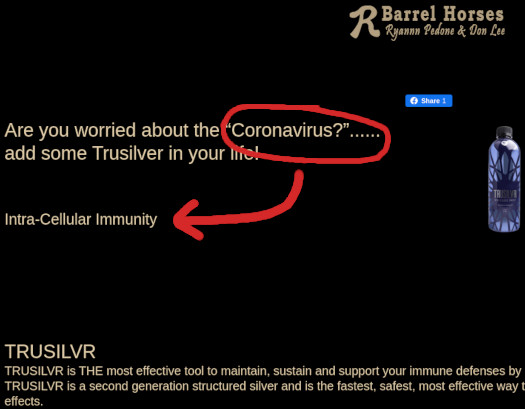
Juuva themselves openly claim TruSilvr ‘is a 15 ppm nano-silver solution that destroys years, bacteria, viruses, and mold to maintain, sustain and support your immune defenses.

As per an FTC advisory related to silver supplements dated March 9, 2020;
There currently are no vaccines, pills, potions, lotions, lozenges or other prescription or over-the-counter products available to treat or cure coronavirus disease 2019 (COVID-19).
Don’t even think about marketing a product unless you can support your claims with sound science.
Under the FTC Act, claims that a product can prevent or treat a serious disease require the support of well-controlled human clinical studies.
For their part Juuva don’t appear concerned they and their affiliates are violating the FTC Act.
The examples I found were what was available publicly with low effort. Who knows how Juuva is being marketed on social media in private, particularly in China.
Moving on from medical claims, on the whacky side of things we have an energy pitcher, energy stick, anion emitter and cation shield.
If there are any peer-reviewed studies into these products I’m not aware of them. Typical MLM woo you can find on Alibaba for a fraction of the price.
With respect to Juuva’s compensation plan, it overtly combines pay to play with a recruitment focus.
In one official Juuva presentation hosted by Jeff Bracken, this was the only slide he brought up with respect to compensation:
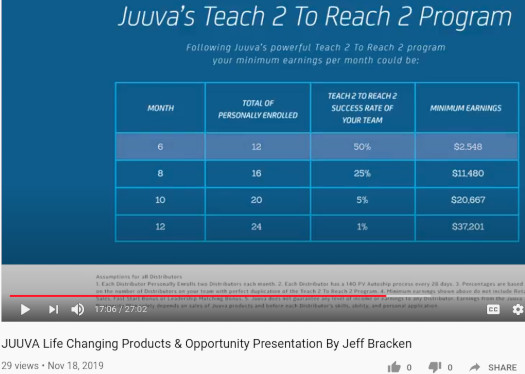
You sign up, recruit two, they recruit two, they recruit two bind badda boom pyramid scheme.
Detailed analysis of Juuva’s compensation plan revealed mandatory affiliate purchases, pay to play and no retail volume requirements.
Whether retail sales count towards PV is unclear. Juuva’s compensation material cites a monthly MPV requirement;
MPV is your Maintenance PVF, all of the personal purchases you order from Juuva in the current 4 week period.
I’ve marked this as PV in our compensation analysis above.
How much a Juuva affiliate spends when they sign up (again a mandatory purchase), also dictates residual and matching bonus rates.
In one of the official Juuva presentations cited for this review, Bracken states;
I tell everyone if you can afford to come in at Professional, it’s a head-start in your business obviously.
Compensation in an MLM company should always be determined based on sales performance. Not how much an affiliate themselves spends when they sign up and continues to spend.
These red flags are all hallmarks of a pyramid scheme, leading me to believe retail is either non-existent or insignificant within Juuva.
Although not direct proof of this, one particular video I came across emphasized what’s behind Juuva requiring affiliates to spend money to earn.
Tony and Fawn (I couldn’t catch their last name) had recently signed up with a Juuva Builder Pack.
On March 6th 2019 they uploaded an unboxing video to their Juuva Journey YouTube channel.
The video is pretty cringey, but what stands out the most is the complete lack of awareness of the products Tony and Fawn have purchased.
[0:06] We just joined and we… we we were all in, so we bought the, what is called the Super Builder Pack.
The Super Builder Pack has all the products and it comes in these two boxes. And this is going to be an unboxing video of all these great products.
And frankly, I don’t really know what’s in these boxes.
Fawn goes on to describe Juuva’s Anion Emitter as a “magic stick that takes pain away”.
[1:01] We didn’t join Juuva because of the products.
What we really joined for was not necessarily the products but it was for … transformation. We love transforming lives.
By “transforming their lives”, Tony and Fawn are of course referring to income.
They basically signed up and bought every Juuva product for income purposes.
If that’s not a clear-cut case of inventory loading (another pyramid signal), I don’t know what is.
As I write this Tony and Fawn’s video has racked up four views in 15 months, one of which is mine.
Juuva Journey has two videos in total uploaded to it, the last of which was on March 7th, 2019.
I wasn’t able to ascertain whether Tony and Fawn are still with the company.
In any event by signing up as a Juuva affiliate, essentially you’re buying into questionable products fronting a recruitment-driven backend.
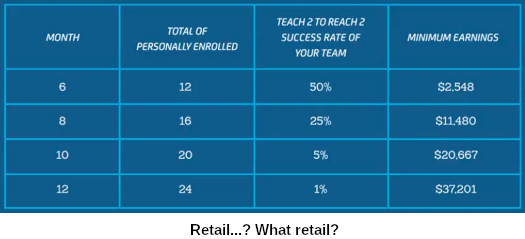
And the bottom-line is that’s not a long-term sustainable business model. Regulatory issues aside.
Given the questionable medical claims used to market Juuva’s products, I can’t even recommend trying them first as a retail customer.
Update 7th April 2021 – In March 2021 Juuva acquired Bulavita from LaCore Enterprises.


Yeah, they’re asking for it with those health claims.
I suppose like some other nutrition mlm companies, they’re willing to take their chances until the authorities start sending cease and desist letters.
Looks like another one that won’t be around for very long if they don’t get their act together.
Comp Plan is perfect to make corporate all the money. Horrible compensation plan for an ambassador. Run away.
They purchased Bulavita o get their hand on the Muscadine.
They keep it for 4 months then they got the muscadine then Juuva dump the company.
They dumped Bulavita due to Bill Andreoli’s and Todd Smith’s groups being crooked, and going against what Grant Pace advised them to do in the beginning by setting the majority of the unilevel up to fail when moving to the binary, no other reason.
“Me” is drinking the Andreoli/Smith kool-aide they spewed out. I wonder how much 8 or so year old Fiji turmeric and ginger Smith is still trying to pedal to unsuspecting people?
Grant Pace dumped them when he realized they were untrustworthy.